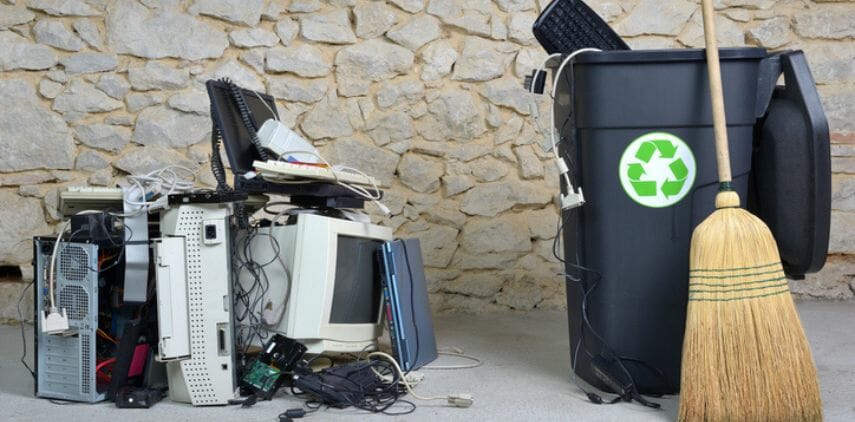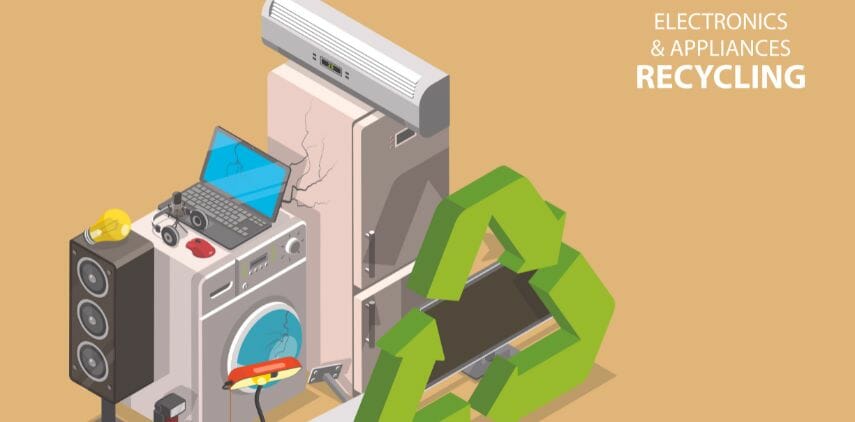Recyclable Electronics materials refer to electronics that can be used for recycling and recovering of valuable materials. Recycling electronics helps conserve natural resources, decrease energy consumption, reduce pollution and reduce landfills. It also allows manufacturers to reuse components in the production process and create new products from recycled electronics.
Manufacturers are increasingly designing their products with recyclability in mind, making them easier to disassemble and recycle. Additionally, recycling centers have expanded their services to accept more electronic waste.
Recycling electronics is one of the most effective ways to prevent pollution caused by discarded electronic devices such as computers, televisions, cell phones, and other electronic gadgets. The materials recovered from electronics recycling can be reused to create new products, reducing the need for raw materials and resulting in a smaller environmental footprint.
Reusing electronics helps conserve natural resources and reduce energy consumption by avoiding the extraction of raw materials and manufacturing processes necessary for production of new electronics. Additionally, electronics manufacturers are increasingly developing greener electronics that have minimal environmental impact when recycled.
When electronics end their useful life, they should be disposed of responsibly at an electronics recycling center or e-waste collection event. This will ensure that valuable materials can be extracted from the electronics before being discarded safely into landfills or incinerated.
Recycling electronics is beneficial to both people and the environment.
What are the benefits of recycling electronics?
By recycling electronics, we can reduce pollution, conserve natural resources, decrease energy consumption and reduce landfill usage. Additionally, electronics recyclability allows manufacturers to reuse components in the production process and create new products from recycled electronics. Finally, recycling electronics helps manufacturers develop greener electronics with minimal environmental impact when recycled. With these benefits in mind, it’s important to responsibly dispose of unwanted electronics at an electronics recycling center or e-waste collection event. Doing so will help ensure that valuable materials are extracted from the electronics before being discarded safely into landfills or incinerated. By taking part in electronics recycling, everyone can benefit from a cleaner environment and healthier world!
What are the recycling steps for electronics?
The recycling process for electronics consists of four steps. The first step is to collect and transport the electronics waste to an electronics recycling center or e-waste collection event. The second step is sorting, which involves separating the electronics into different categories based on their components and materials. Next, electronics that can be reused are refurbished if necessary, while those that cannot be reused are broken down into parts. Finally, any metals or plastics recovered from the electronics are melted down and used in the production of new products. Electronics recycling centers often partner with organizations that specialize in extracting valuable materials from electronics waste.
What are the challenges of recycling electronics?
One of the main challenges faced when recycling electronics is that some electronics contain hazardous materials such as lead, mercury, and other toxins. If these components are not disposed of properly, they can leach into soil or groundwater and cause severe environmental damage. Additionally, electronics contain various materials such as metals, plastics, and rare earth elements that must be extracted before being recycled into new products. This process can be challenging to manage due to the complexity of electronics. Furthermore, electronics recycling centers may need more technology and infrastructure to recycle electronics waste on a large scale efficiently. Finally, public awareness of electronics recyclability needs to be higher despite efforts by manufacturers and organizations to promote electronics recycling among consumers.
What electronics have gold in them
Many electronics contain gold in some form, such as circuit boards and connectors. Gold is popular among electronics manufacturers due to its conductivity, corrosion resistance, and durability. Common electronics that contain gold include cell phones, laptops, tablets, computer processors, and gaming consoles. Electronics like TVs and printers may also contain trace amounts of gold. It’s important to remember that when disposing of electronics responsibly at an electronics recycling center or e-waste collection event, all valuable materials will be extracted before the electronics are safely discarded into landfills or incinerated. By participating in electronics recycling, everyone can benefit from a cleaner environment and healthier world!
What electronics have platinum in them
Platinum is a precious metal that has many uses in electronics. It is often used in electronic components such as resistors, transistors, and capacitors due to its high electrical conductivity, corrosion resistance, and durability. Additionally, platinum can be found in electronics such as computers, tablets, cell phones, and televisions. It may also coat specific electronic components to enhance performance or reduce interference with other electronic components nearby. When disposing of electronics responsibly at an electronics recycling center or e-waste collection event, all valuable materials will be extracted before the electronics are safely discarded into landfills or incinerated. By taking part in electronics recycling everyone can benefit from a cleaner environment and healthier world!
How electronics changed the world
Since the invention of electronics, our world has been transformed countless ways. Electronics have enabled us to do things that were once impossible and have connected people across the globe like never before. Electronics have revolutionized almost every industry, from communication and entertainment to healthcare and transportation.
Through electronics recycling initiatives, we can ensure that our electronics are disposed of responsibly while also helping to reduce environmental pollution and contributing to a more sustainable world.
The early days of electronics and the development of vacuum tubes.
The early days of electronics saw the development of vacuum tubes used to manipulate electricity. Vacuum tubes were first developed by Thomas Edison in 1884, but it wasn’t until Lee De Forest invented the triode in 1906 that their true potential began to be realized. These vacuum tubes allowed for amplifying electrical signals and for complex circuits to be created, ushering in a new era of electronics. Over the years, these electronics have become more and more complex, leading us to the modern electronics we know today. From communication to entertainment, electronics have shaped our world like never before! By participating in electronics recycling initiatives, everyone can benefit from a cleaner environment and healthier world!
The introduction of transistors and the development of integrated circuits.
The introduction of transistors in 1947 revolutionized electronics. Transistors allowed for smaller, faster electronics that were more reliable and less expensive than those powered by vacuum tubes. Over the years transistors became increasingly powerful, leading to the development of integrated circuits (ICs) in 1958. I combined multiple transistors into one unit, making electronics more compact and powerful. This led to the development of microprocessors, which are now found in almost every electronic device, from computers and cell phones to vehicles and home appliances. Through electronics recycling initiatives, we can ensure that our electronics are disposed of responsibly while also helping to reduce environmental pollution and contributing to a more sustainable world.
The rise of digital technology and the impact it has had on society.
Over the last few decades, electronics have become increasingly digital, allowing various technologies and applications to be developed. From big data analytics and cloud computing to artificial intelligence and virtual reality, electronics have revolutionized almost every aspect of our lives. Along with this rise in digital technology has increased connectivity, enabling people to connect and collaborate across the globe like never before. Additionally, electronics have improved our quality of life by providing us with access to information and services at any time from anywhere. By participating in electronics recycling initiatives, everyone can benefit from a cleaner environment and healthier world!
The future of electronics and how it will continue to change the world.
As electronics become even smaller, faster, and more powerful, the possibilities for improving our lives are endless. From self-driving cars to smart homes and beyond, electronics will continue to play a crucial role in shaping the future of our world. Additionally, electronics recycling initiatives will help us reduce environmental pollution and contribute to a healthier planet. In short, electronics have already had an immense impact on modern society and will continue changing the world in countless ways!
Conclusion
Recycling electronics is essential to creating a more sustainable and environmentally-friendly world. Electronics recycling centers provide consumers with an efficient and safe way to dispose of electronic waste while also extracting valuable materials for reuse in new products. However, electronics can contain hazardous materials that must be disposed of responsibly in order to prevent environmental damage. Additionally, electronics may contain precious metals such as gold or platinum, which must be extracted before the electronics are recycled. By taking part in electronics recycling initiatives everyone can benefit from a cleaner environment and healthier world!







